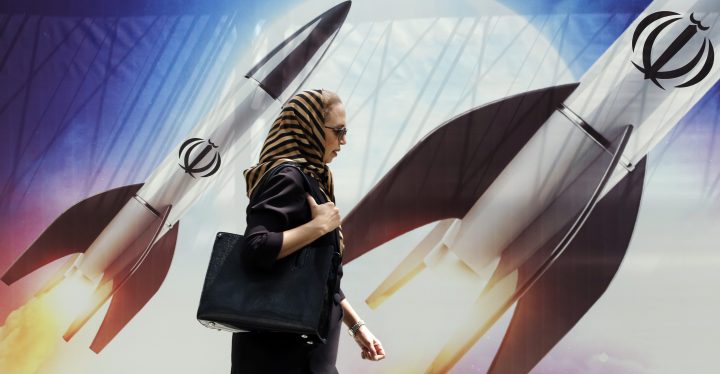MIDDLE EAST CRISIS UPDATE: 17 APRIL 2024
Key Western ally Jordan on edge after Iran attack; Israel weighs up retaliation options

Iran’s unprecedented attack on Israel and the prospect of escalating hostilities has threatened to embroil Jordan, a key Western ally and a country regarded by Gulf states as pivotal to their security.
Israel is vowing to retaliate against Iran for its weekend drone and missile attack, the first strike on the Jewish state from Iranian soil, which brought into the open a years-long shadow war. As the US and Europe urge restraint, Israel is weighing its choices.
US Treasury Secretary Janet Yellen warned that the US would strengthen its sanctions on Iran within days after the nation’s recent attack on Israel.
Iran’s conflict with Israel puts US ally Jordan on edge
Iran’s unprecedented attack on Israel and the prospect of escalating hostilities has threatened to embroil Jordan, a key Western ally and a country regarded by Gulf states as pivotal to their security.
When the Islamic Republic fired a barrage of missiles and drones at Israel on Saturday night, Jordan helped shoot down some that flew over its capital, Amman, with Foreign Minister Ayman Safadi saying the kingdom saw the projectiles as posing “a real danger” to its territory.
While he was quick to say the country would do the same if Israel were to use Jordanian airspace to attack Iran, the move led to a torrent of online abuse in the Islamic Republic. State media reposted a missive on social media site X calling Jordanian King Abdullah II “a traitor” and pro-Tehran accounts shared memes of the king dressed in an Israel Defense Forces uniform.
It was all too much for Jordanian authorities, who summoned the Iranian ambassador to demand an end to the insults.
Jordan had already seen weeks of protests in Amman in support of Hamas, the Iran-backed militia that Israel has been fighting in Gaza since October, and the Palestinians who have died or had their lives upended by the conflict.
Authorities have also been on high alert after Iran-backed Iraqi militia leader Abu Ali Al-Askary vowed to flood Jordan with enough weapons for 12,000 fighters to march on Israel.
All of this has raised concerns about Jordan’s stability in Abu Dhabi and Riyadh, and Saudi Arabia Crown Prince Mohammed Bin Salman and United Arab Emirates President Sheikh Mohammed Bin Zayed have offered their support to King Abdullah.
“For Saudi Arabia, Jordan is a bulwark against further Iranian expansion” in the Levant, said Ali Shihabi, a Saudi commentator close to the royal court.
It all adds up to a conundrum for Jordan, a kingdom of some 11 million people, many of them descendants of Palestinian refugees, sandwiched between Iraq, Israel, Saudi Arabia, Syria and the Palestinian territory of the West Bank. Jordanian officials feel caught between an Israeli government which they openly describe as a threat to regional peace and security, and a confrontational Iranian regime eager to leverage the increasingly unpopular war in Gaza to expand its influence and reach.
Jordan is not the only Arab country trying to balance countering Iran with rising pro-Palestinian sentiment. Saudi Arabia has downplayed reports it also shot down some of the projectiles fired by Iran. The country and the UAE said they were both deeply concerned about the regional political situation following Saturday’s attack, but neither explicitly condemned Iran.
Speaking to US President Joe Biden on Sunday, King Abdullah warned that any Israeli retaliation to Iran’s missile and drone attacks would expand the conflict in the region. “Jordan will not allow for a regional war to unfold on its land,” the king said.
Amman’s balancing act has grown increasingly precarious as the war in Gaza has entered its seventh month. Authorities have allowed almost daily protests outside the Israeli Embassy and have not permitted the Israeli ambassador to return since November, but have resisted popular demands that it sever ties with Israel completely.
Jordan is dependent on billions of dollars of aid from the US and the European Union and enjoys longstanding and deep military and security cooperation with the West, limiting its ability to distance itself from the Jewish state.
What are Israel’s retaliation options after Iran strike?
Israel is vowing to retaliate against Iran for its weekend drone and missile attack, the first strike on the Jewish state from Iranian soil and which brought into the open a yearslong shadow war. As the US and Europe urge restraint, Israel is weighing its choices.
Prime Minister Benjamin Netanyahu said the country would respond, but hasn’t given any details about how or when. His government says a failure to act would signal weakness and encourage further attacks by its arch-enemy.
Here are some options:
A strike on Iran’s nuclear facilities: This would be among the riskiest and most aggressive of the choices, and could force Iran to lash out at Israel again, potentially triggering a regional war the US, Europe and Arab states are so keen to avoid.
Israel, which bombed an Iraqi reactor in 1981 and a Syrian atomic site in 2007, has long considered Iran’s nuclear programme a threat to its existence. Most of Tehran’s nuclear facilities — which Iran says are for peaceful purposes but Israel says are for building bombs — are hidden deep underground, making them hard to reach. In the view of many strategists, Israel would require US help.
Another target could be Iran’s Bonab Atomic Research Centre, the closest site to Israel and 500km south of Azerbaijan, an Israeli ally. While it’s one of Iran’s less important nuclear facilities, hitting it would send a strong signal about Israel’s military capabilities.
Strikes or cyberattacks on military infrastructure in Iran: Israel could target Iranian military facilities or other important infrastructure within the Islamic Republic, either via a direct strike or a cyberattack. That would send a message of deterrence by hitting Iranian soil while minimising casualties, according to Sima Shine, who formerly headed the Mossad intelligence agency’s research division.
Israel has for years been blamed for cyberattacks on both civilian and military sites in Iran — as well as assassinations of Iranian nuclear scientists and other intelligence operations — but has never claimed responsibility.
Any missile or drone strike on Iranian soil, no matter the target, would be major for Israel. But it wouldn’t necessarily be the first attack in Iran by Israel. Former Prime Minister Naftali Bennett said Israeli forces destroyed a drone base in Iran in 2022 under his orders.
Hitting Iranian proxies in the Middle East: Israel could also choose to strike some of Iran’s proxy militias such as Hezbollah in Lebanon or the Houthis in Yemen. There are also groups in Iraq and Syria. These are funded by Tehran and target Israel on its behalf.
Israel has exchanged daily fire with Hezbollah since the war against Hamas began in Gaza in October. It has also fended off missiles and drones from the Houthis, who have also attacked Israeli-linked ships around the Red Sea. Still, the fighting has been kept below the threshold of all-out war.
In addition, Iran has military personnel embedded with those groups, many belonging to the Islamic Revolutionary Guard (IRG) Corps. Israel could choose to target them specifically, as Iran said it did on 1 April when two IRGC generals were killed by a strike on Tehran’s embassy compound in Damascus. Iran said its attack on Israel over the weekend was a legitimate response to that incident.
Focus on Gaza: Some urge Israel to focus on its six-month-old war in Gaza and destroying Hamas, including in the city of Rafah where the Israeli government says around 8,000 of the group’s fighters are lodged.
Defeating Hamas, which receives training and funding from Iran, would mark a victory for Israel against Iran, said Yossi Kuperwasser, a former research head of military intelligence. “This entire war, from day one, is a war against Iran,” he said. “We have to finish the job in Gaza in order to cause much damage to the Iranian axis.”
Yellen ‘fully’ expects fresh sanctions on Iran in coming days
US Treasury Secretary Janet Yellen warned that the US would strengthen its sanctions on Iran within days after the nation’s recent attack on Israel.
“I fully expect that we will take additional sanctions action against Iran in the coming days,” Yellen said at a press conference in Washington on Tuesday. She also said that “all options” to disrupt Iran’s terrorist financing would be on the table, and that the US wouldn’t hesitate to work with allies to “continue disrupting the Iranian regime’s malign and destabilising activity”.
Her comments come as finance ministers and central bank governors from across the world gather in Washington for the International Monetary Fund and World Bank spring meetings. Geopolitical developments are set to once again dominate the discussions, with conflicts in Ukraine and the Middle East continuing to pose a threat to the global economy.
European gas erases year-to-date losses as Israel vows response
European gas prices erased this year’s losses amid fears of a broader escalation of the conflict in the Middle East after top Israeli military officials reasserted that their country had no choice but to respond to Iran’s weekend attack.
Benchmark futures closed up 6.4% on Tuesday, in a fourth consecutive daily advance. Mounting geopolitical risks this month have forced traders to re-evaluate their optimism for Europe’s energy supplies after Russian strikes on Ukrainian energy infrastructure and the latest tensions in the Middle East highlighted the vulnerability of global trade flows.
While contracts at one point lost about 30% of their value since the start of the year — with an exceptionally mild winter weighing on gas demand — they’re now up slightly in 2024.
European and US officials have boosted their calls for Israel to avoid a tit-for-tat escalation that could provoke a wider war. A broader conflict in the region risks pushing up global energy prices further when central banks are still trying to rein in inflation. DM
Read more in Daily Maverick: Middle East crisis news hub

















 Become an Insider
Become an Insider
Israeli revenge should best be served cold.
Opening with “Iran’s unprecedented attack” without mentioning Israel’s attack on the Iranian consulate in Lebanon as the immediate cause. The same approach as opening with the Hamas attack on 7 October as if that was the start of the conflict in the region. So much for balanced reporting.
Apologies, consulate in Syria. But the point still stands